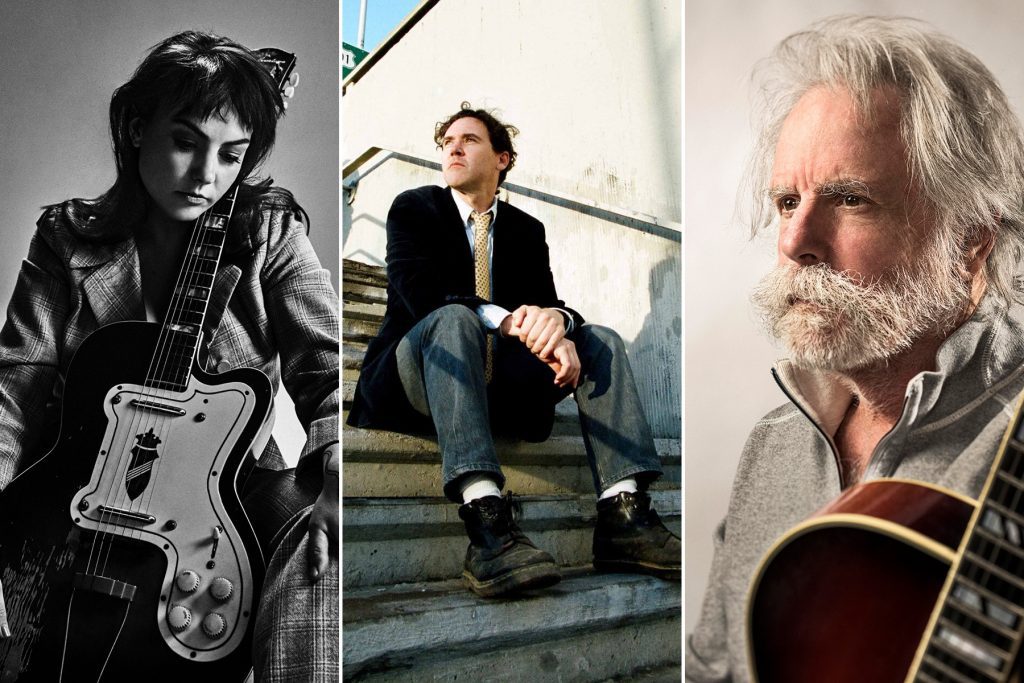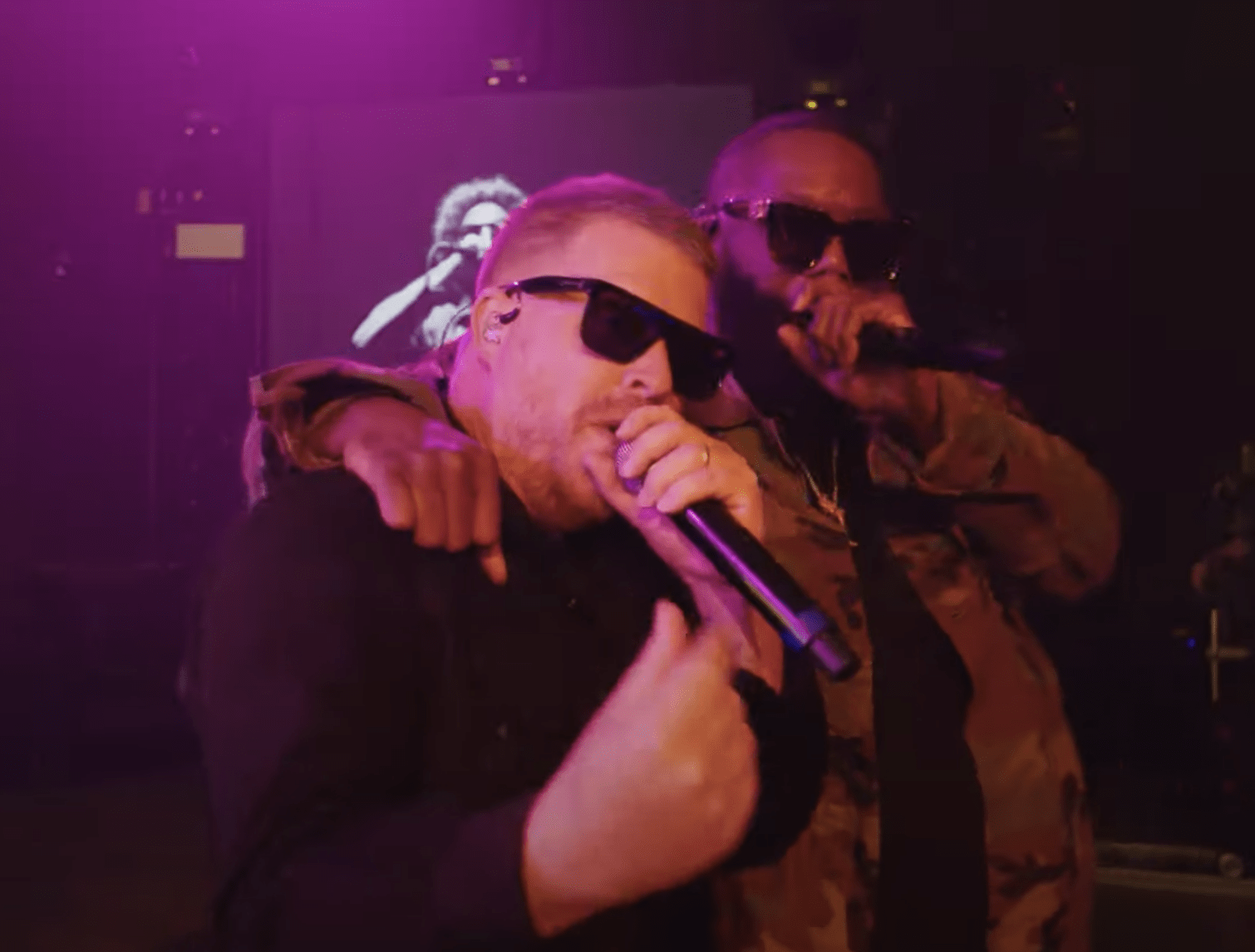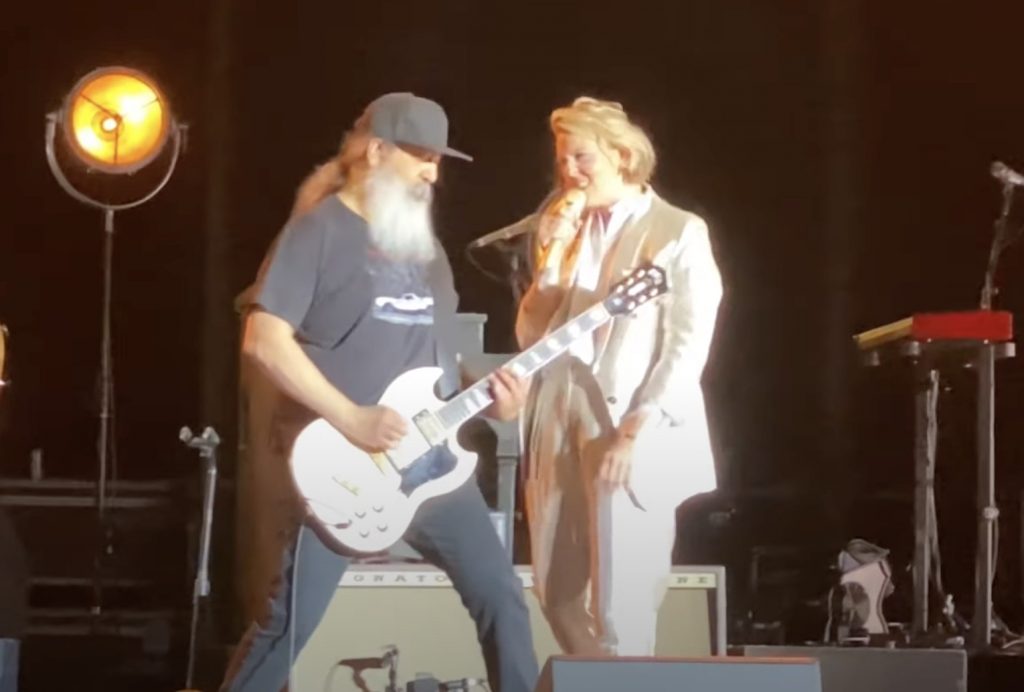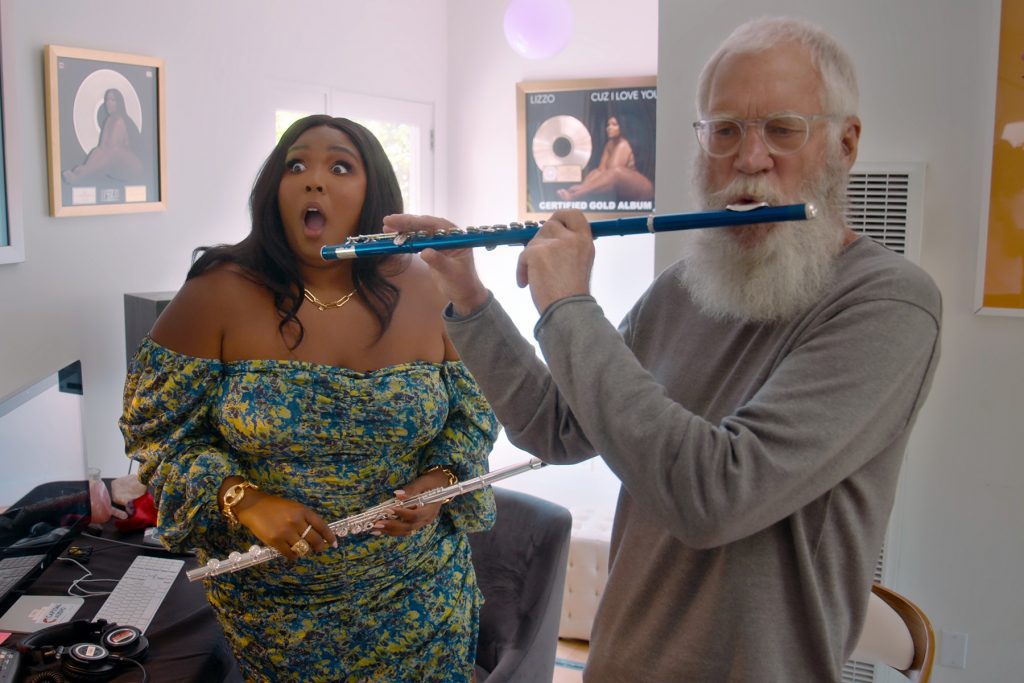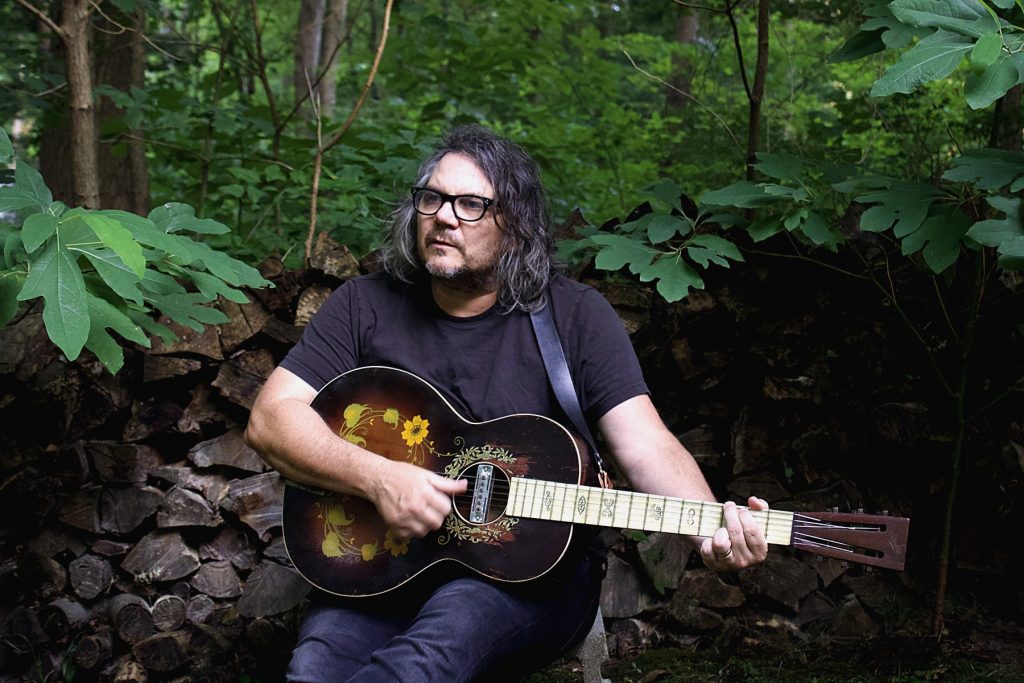
Jeff Tweedy Is an Open Book
Jeff Tweedy makes a point of working on music every single day, but lately he’s been a little distracted. “The election is making it harder than normal to focus,” he says over Zoom from Wilco’s Chicago recording space, the Loft. “It’s hard to play the guitar and check FiveThirtyEight at the same time.”
That aside, Tweedy is in the middle of an extraordinarily productive autumn. He’s just released a new solo album, Love is the King, full of subtle folk and country songs and sharp jolts of electricity, which he recorded at the Loft after Wilco’s spring tour was canceled due to the pandemic. Earlier in October, he also published How to Write One Song, a delightful sequel to his 2018 memoir, Let’s Go (So We Can Get Back). The new book is filled with revealing stories about his creative process through the years, and practical tips for nurturing your own inner songwriter — including lyrical exercises like making a “word ladder” of mismatched adjectives and nouns, or rifling through a favorite book while humming a melody.
blogherads.adq.push(function () {
blogherads
.defineSlot( ‘medrec’, ‘gpt-dsk-tab-article-inbody1-uid0’ )
.setTargeting( ‘pos’, [“mid-article”,”mid”,”in-article1″,”mid-article1″] )
.setSubAdUnitPath(“music//article//inbody1”)
.addSize([[300,250],[620,350],[2,2],[3,3],[2,4],[4,2]])
;
});
Writing songs every day is somewhere between a steady job and a spiritual practice for Tweedy, 53. “I sincerely feel a need to have that in my life,” he says. “I feel better when I do it, and I try not to miss days. It’s like working out or something, almost.” Not every day is full of sparkling brilliance; the important thing for him is to keep at it even so. “Sometimes it’ll be more like maintenance work,” he continues. “But that leads to putting myself in the path of some inspirational moment where I have an idea that I get super-excited by.”
Tweedy stayed on the line for a wide-ranging conversation about Wilco’s catalog, from 1999’s Summerteeth to 2016’s Schmilco and beyond; how his own approach to making records has evolved over time; his commitment to standing in solidarity with the Black Lives Matter movement; and why he’s feeling optimistic about Joe Biden’s chances on Election Day.
You write in the book about how deadlines and constraints can be helpful to creative work. Has the quarantine era worked that way for you — here’s a bunch of time, might as well do something?
I’m well-suited to quarantine. I’m pre-pandemic’d in my habits. In some ways, it’s a little bit more open-ended, because it’s the first time in my life where I don’t know when I’m going to be touring again. That’s really new. But I’ve tended to keep a pretty regimented work schedule and a small isolation pod, even before the pandemic.
You recorded your new album entirely with your two sons, Spencer and Sammy Tweedy. When they were little, did you ever think to yourself, “In about 20 years, these guys could be my band?”
That never crossed my mind when they were really little. Spencer started playing the drums very, very young, and exhibited some natural ability at a very early age. I never thought about it becoming a professional pursuit, but I did enjoy getting on the floor and playing with him when he was really young. Sammy wasn’t ever quite as focused on the musical instruments in our house until he got to be more of a teenager. I think it’s probably because it was his big brother’s thing for a long time, so it was something that he might have pushed away a little bit to have some autonomy and have his own personality. But eventually he succumbed to the siren song of all of the gear in the house.
A lot of people right now are trying to do creative work with even younger kids at home. Do you have any advice for how to stay creative when you’re also changing diapers or helping your kid with remote classes?
blogherads.adq.push(function () {
blogherads
.defineSlot( ‘medrec’, ‘gpt-dsk-tab-article-inbody2-uid1’ )
.setTargeting( ‘pos’, [“mid-article2″,”mid”,”in-article2″,”mid-article”] )
.setSubAdUnitPath(“music//article//inbody2”)
.addSize([[300,250],[300,251],[620,350],[2,4],[4,2]])
;
});
Well, one way of looking at it is that you get to spend way more time with the ultimate teachers of creativity — these little humans that are improvising all day long at virtuosic levels. They’re continuously innovating ways to interact with the world. That’s amazing and inspiring to be around, to me.
But in the book, there’s some helpful tips for that, [like] reminding yourself that your idealized amount of time that it would take to make something is just an impediment that you’ve put in your way to getting started. In other words, if you said, “I’m just going to accept what I can make in five minutes,” chances are you might spend 10 minutes and make something that you got lost in a little bit more. Not necessarily with the goal of it being great. Just getting started is the important part.
You’re playing some really cool lead electric guitar on this new album, more than you’ve done in quite a while. What drew you back to that?
I mean, I’ve played a lot of electric guitar on every record. More so than maybe a lot of people think. But the times where I’ve spent the whole record playing leads — the last time I did it was maybe A Ghost is Born. And it makes sense to me, because that was one of my lowest points outside of music, right before I had to go to the hospital and get well. I think that the outside world probably is most evident in the guitar playing on this record. It just seems like that’s the easiest instrument for me to reach for when I don’t know what to say, but I’m feeling a lot.
When you weren’t playing as many guitar solos with Wilco in the decade and a half since A Ghost Is Born, was it in part about not wanting to revisit that part of your life?
Like I said, I’m in there on a lot of things where people might assume that it’s someone else. Maybe it’s because it’s a solo record that people are hearing it as me. That being said, there’s obviously things that Nels [Cline] does that I could never do, and they’re there on all of those records post-A Ghost is Born. I think the primary focus is exactly where it should be, on Nels’ playing.
I got frustrated with not being able to be both of those guys, and I had to make a prioritized choice. To me, that’s a totally different guy than the guy that’s strumming acoustic guitar and singing, the songwriter. The electric guitar guy is a commentator in a way. And I could never really fuse those two things together performance-wise, to be honest. That’s something that making a record during quarantine allows you to do maybe a little bit more.
blogherads.adq.push(function () {
blogherads
.defineSlot( ‘medrec’, ‘gpt-dsk-tab-inbodyX-uid2’ )
.setTargeting( ‘pos’, [“mid”,”mid-articleX”,”in-articleX”,”mid-article”] )
.setSubAdUnitPath(“music//article//inbodyX”)
.addSize([[300,250],[300,251],[3,3],[620,350]])
.setLazyLoadMultiplier(2)
;
});

Wilco in 2001.
Paul Natkin/Getty Images
There’s a deluxe reissue of Wilco’s Summerteeth coming out in November. How much time did you spend going back over that material?
I didn’t put a whole lot of time into it. We have a great team of people doing the archives [with reissue producer] Cheryl Pawelski. Spencer actually did a lot of listening through the demos. He found a box of cassettes of demos. He contributed a lot. I listen to everything maybe a few times.
It was interesting to hear in hindsight. What I feel is that there was a band getting really good at doing something that I didn’t want to do anymore. [Laughs.] There’s a band that was geared towards playing Being There and having a debauched rock & roll style of presenting ourselves. When I hear it, I can hear myself being skeptical about that presentation. I just wanted more room to grow than I felt like I’d seen other bands that did that type of thing were able to grow.
Do you feel like you’ve been able to resolve some of that tension between the different kinds of music you could make with Wilco since then?
Well, Wilco is a completely different band now. Wilco is an ensemble that is built around having more latitude to be good at those things — but also to branch off into tangents that would have been really, really difficult for the Summerteeth-era band. That’s been the goal for a long time, and it started even before Summerteeth. I just like the idea of the Flamin’ Groovies being able to exist in the same universe as Can, to pick two bands off the top of my head. Just wanting there to be a wider section of my record collection to draw upon.
I asked because, listening to the last few things you’ve done, it seems like you’ve gotten more comfortable with going back to that well of folk-y or country-ish music, not necessarily having to push it into another plane.
I think that’s possibly true. But I also think that we’ve been doing what we’ve been doing for so long that if somebody else had come out of nowhere and put out an Ode to Joy record — or even Schmilco, to me, is much weirder than it’s ever given credit for. I think people expect some of that from us, so it takes away a little bit of the surprise that might have been there when something like Summerteeth emerged.
blogherads.adq.push(function () {
blogherads
.defineSlot( ‘medrec’, ‘gpt-dsk-tab-inbodyX-uid3’ )
.setTargeting( ‘pos’, [“mid”,”mid-articleX”,”in-articleX”,”mid-article”] )
.setSubAdUnitPath(“music//article//inbodyX”)
.addSize([[300,250],[300,251],[3,3],[620,350]])
.setLazyLoadMultiplier(2)
;
});
What kind of weirdness do you think people are missing in Schmilco?
[Laughs.] “Common Sense” is about as weird as anything we’ve ever done. It’s a shape that I don’t think that most people would associate with a folk song. “Locator,” to me, isn’t particularly straightforward.
At the same time, I think something like “Jesus, Etc.” is extremely classic-sounding in its form and shape. A lot of things were taken for granted on the records that people associate with experimentalism. I never really bought that, either.
A word that drives me crazy is “mellow.” Whenever somebody uses the word “mellow” to describe the music that I’m a part of, I hate them. I just feel like they don’t know how to turn their stereo up or something. There’s a lot more spirit and there are a lot sharper edges to what is there, than it just being loud and yell-y, you know? I’m not really sure what they mean. I know lots of mellow music, and I don’t feel mellow about it.
Speaking of “Jesus, Etc.,” we’re about a year away from the 20th anniversary of Yankee Hotel Foxtrot, which is the most widely beloved, canonized album that Wilco has made. How do you feel about that assessment?
For all of my grumpiness about some things we were just talking about, I feel overwhelmingly grateful that there are any records still being listened to by anybody. I could never have imagined that. Or maybe if I had imagined, it would have been at the highest end of my aspirations my whole life, to have something that stays relevant to some people over time. And it’s not just that record. There are a lot of records, even Uncle Tupelo records, that have maintained some presence in the minds of music listeners for much longer than I would have anticipated. It’s really beautiful.
Did you think about those things more earlier in your career — trying to make something that would stand the test of time?
No. I don’t think I think about it now, and I don’t think I really thought about it then. My aspirations would have been based on, “Wow, it’d be cool to have a record that people listen to.” But when you’re making a record, then and now, I want to make a record that I want to listen to, and that I don’t already have on my shelves.
blogherads.adq.push(function () {
blogherads
.defineSlot( ‘medrec’, ‘gpt-dsk-tab-inbodyX-uid4’ )
.setTargeting( ‘pos’, [“mid”,”mid-articleX”,”in-articleX”,”mid-article”] )
.setSubAdUnitPath(“music//article//inbodyX”)
.addSize([[300,250],[300,251],[3,3],[620,350]])
.setLazyLoadMultiplier(2)
;
});
I read that you’ve been working remotely on a new Wilco album this year. How is that working out?
Well, a lot of the work on it was done together at the beginning of this year. We actually got in some sessions before the lockdowns and before our tour that ended up getting canceled. So there’s a little chunk of music that was already being worked on, and I’ve been doing what I normally do, with the goal in mind of being able to put together some tracks to send out to everybody in the coming months.
It’s really thrilling. There’s a lot of motivation, and I feel very inspired to make something that will be worthy of the catharsis that will come along with playing music in front of people again. I want to make something loud and joyous, and a sonic event that will be glorious enough for that type of moment that I’m picturing. I don’t know if it will happen that way. It will probably just inch back into normalcy. But I’m imagining a floodgate opening and everybody being able to go to shows and pack in front of the stage and sweat together. I’m picturing the album that I want to make for that audience.

Wilco in 2019.
Annabel Mehren*
This summer, you announced a plan to dedicate a share of your songwriting royalties toward reparations for black Americans, and you called for others to join you. How has that project been going?
It’s been going slower than I would have hoped. But it’s going, and that’s hopeful to me. It’s progressing, and it does seem likely that some type of plan similar to the one I described will be put in place, at least with some organizations, in the near future.
You spoke early on about being frustrated that there weren’t many other artists signing on to take the same pledge. Has that changed at all?
Not really. There have been a handful of people that have reached out. My daydream was that a major star, or somebody with a lot higher profile than myself, would have reached out or maybe just even taken the idea and not even given me credit. I would have been happy with that! Someone with a little bit more industry influence, that would have been great. But I don’t think we need it to get to where we wanted to be. And I can also see that there might be a lot of wait-and-see kind of feelings about the program I presented. It’s not like I’m a longtime trusted source of information about how to fix this situation. Basically, I just felt like there weren’t any good excuses for me not to say what I was thinking about at a moment in our country’s history where I felt like that was being asked of everyone.
blogherads.adq.push(function () {
blogherads
.defineSlot( ‘medrec’, ‘gpt-dsk-tab-inbodyX-uid5’ )
.setTargeting( ‘pos’, [“mid”,”mid-articleX”,”in-articleX”,”mid-article”] )
.setSubAdUnitPath(“music//article//inbodyX”)
.addSize([[300,250],[300,251],[3,3],[620,350]])
.setLazyLoadMultiplier(2)
;
});
Are you committed to staying focused on confronting the legacies of racism, even as the conversation may move on for some people?
I haven’t given up on the thought. I’m certainly sincere about the commitment to my own contribution financially. That will be going forward. The sad truth of it is that we are going to continue to have these moments in our country until we figure it out. It’s not something that is going to disappear without some effort, without some commitment from the people that have benefited from the structure of white supremacy in our country for such a long time.
We’re getting very close to Election Day. Are you feeling optimistic?
Yeah. I had a really sick feeling in my stomach in 2016 for a long time leading up to the election that I don’t have quite as bad right now. Being from southern Illinois, from a place that would be very Trumpy, I feel like I have a lizard-brain sense for how things are feeling in places like that. In 2016, it was really clear to me that people from where I was from were going to have a tough time voting for Hillary Clinton. And it scared me, and I did a lot to trick myself into believing it wasn’t going to happen. But then it happened. I don’t think that’s how I feel right now. I feel cautious, because of what happened in 2016. But I don’t have that same nagging, deep, almost ancestral dread of how people from where I’m from are feeling. I think they’re probably pretty fucking sick of this shit.
Joe Biden wouldn’t be my first choice for a lot of reasons, but I also think he might be the best choice, for a lot of the same reasons. When Barack Obama won, a lot of people stopped paying attention, as if everything had been solved at once. I think Joe Biden is going to inspire the people that disagree with him, especially young people.
The Biden campaign produced an ad that suggested he’s the only candidate who can save live music venues from the devastation they’ve faced this year. Do you believe that?
I think a lot of people would be alive today, and the situation with the venues that we’re in danger of losing would be different, if someone like Hillary Clinton had been in office. Sadly, I think a lot of the mitigation efforts that could have given us a better shot at getting out of this quicker — that ship has sailed. Now it’s just going to be hopefully a slow, steady return to some normalcy. But I have no idea how long it’s going to take to get people to feel safe.
blogherads.adq.push(function () {
blogherads
.defineSlot( ‘medrec’, ‘gpt-dsk-tab-inbodyX-uid6’ )
.setTargeting( ‘pos’, [“mid”,”mid-articleX”,”in-articleX”,”mid-article”] )
.setSubAdUnitPath(“music//article//inbodyX”)
.addSize([[300,250],[300,251],[3,3],[620,350]])
.setLazyLoadMultiplier(2)
;
});
We definitely need to take care of our small performance spaces, and big performance spaces. The whole industry is just completely devastated, and it’s going to take a long time to put it back together. But certainly, I don’t at all think that it’s possible with the Trump administration in a second term. We would just get more denialism. I don’t know what the fuck the plan is [from Trump]. There isn’t one.
On a somewhat lighter note, you told one of my colleagues a couple of years ago that you had grown out your hair in protest of Trump’s election. We’re four years into this nightmare, and the hair is still pretty long. Have you thought about cutting it short again if Biden wins?
No. I got a haircut after the House turned in 2018. I didn’t make it the full four years. It was stupid. It was an insufficient reaction to a much more serious problem. [Laughs.] My hair has gotten out of the political game. It’s not a part of my commentary anymore.
When you released your solo album Together at Last in 2017, you announced it as the first volume in a series of acoustic sessions revisiting your older songs. Have you thought about doing any more records like that?
There is a whole other volume of that recorded. I don’t remember the tracklist, but it’s similar, drawing upon all of the different entities that I’ve recorded or written for. We don’t have it on the release schedule or anything for dBpm [Records]. But I’ve had a title for a long time: Together Again.
I like to be able to perform my songs by myself on acoustic guitar. I really enjoy going out and playing solo shows like that. Almost everything I’ve ever written, I’ve tried to figure out a way to put it across by myself, and I like to document that. It’s kind of nice to share that with people that are familiar with those songs, or maybe just prefer something more stripped-down.
The new book includes some great stories about the unexpected origin points for your songs — like the way you wrote “Forget the Flowers” by imagining Johnny Cash singing it, or how “Company in My Back” is written from the perspective of an insect at a picnic. How about “Muzzle of Bees”? Where did that one come from?
blogherads.adq.push(function () {
blogherads
.defineSlot( ‘medrec’, ‘gpt-dsk-tab-inbodyX-uid7’ )
.setTargeting( ‘pos’, [“mid”,”mid-articleX”,”in-articleX”,”mid-article”] )
.setSubAdUnitPath(“music//article//inbodyX”)
.addSize([[300,250],[300,251],[3,3],[620,350]])
.setLazyLoadMultiplier(2)
;
});
I’m not entirely sure I remember exactly where the lyrical imagery came from, but “Muzzle of Bees” would have been likely lyrically to have come from one of the exercises that I describe in the book. Something like a surrealistic game to generate some language disruption.
The original melody in the song was improvised. We used to call sessions “fundamentals,” where we would put on a reel of tape and record an entire album in the time it would take to listen to it. I would sit in an isolation booth and just flip through my notebook and make up songs based on random things, and everybody would play along, not having any idea what I was doing. I wouldn’t be able to hear them, and they would be adding noise with synthesizers and stuff like that. Then we would listen through it once and mix it and put it away.
We did a dozen of those or so, preparing for A Ghost is Born. It’s just an exercise to remind ourselves that a record can be anything, and you don’t have to overthink it. It was exciting and fun to do. A lot of songs were written in that style at that time that ended up on A Ghost is Born. I think “Less Than You Think” is from that type of exercise, and “Muzzle of Bees” started that way for sure. It’s just committing to what’s going to happen, as opposed to what you think is supposed to happen.
You also discuss writing lyrics by taking phrases that come up spontaneously in conversation. It doesn’t even have to be a particularly great conversation. Do you feel like you could write a great song out of the conversation you and I just had?
Yeah. You just said “Doesn’t Have to Be,” and that would be a great song title to me. You could think of a million things that don’t have to be, and start there.

